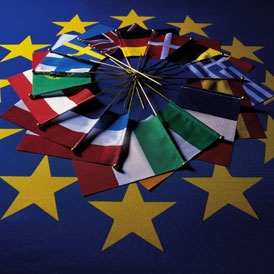France and Germany have broken borrowing rules
As France and Germany push for sanctions for eurozone members who break borrowing limits, Channel 4 News can reveal that both countries are among the worst offenders.

French President Nicolas Sarkozy and German Chancellor Angela Merkel are seeking a new European treaty that would include automatic sanctions for countries which break the rules on borrowing.
Countries in the eurozone would have to abide by a rule that says budget deficits – the difference between what governments spend and raise in taxes – have to be within 3 per cent of gross domestic product (GDP).
This rule exists at the moment. It has been in place since the 1992 Maastricht Treaty was signed, but sanctions have never been imposed on member states.
This shows that of 12 members of the single currency, 10 have run up budget deficits beyond the 3 per cent limit since 1999. From 1999-2011, Greece has broken the rules every year, Portugal in 10 of those years and Italy eight.
France and Germany
Next is France (seven), followed by Germany (five). In contrast, Ireland, which had to be bailed out because of the state of its public finances, was outside the 3 per cent limit in four of those years.
It is far from clear whether the new sanctions will be enforced. Pawel Swidlicki, Open Europe
Spain, which like most eurozone countries is adopting tough austerity measures to put its public finances in order, also broke the rules in four of those years. Only Luxembourg and Finland were within the limit every year.
Pawel Swidlicki, a researcher at the Open Europe think tank, told Channel 4 News: “Automatic sanctions for eurozone countries running deficits above 3 per cent are all very well in principle, but given that only Luxembourg, Finland and Estonia have managed to consistently fulfil these criteria, it is far from clear whether the new sanctions will be enforced.
“It’s difficult to see how this process won’t again become mired in political wrangling between the EU and member states, especially if one of the larger countries, say France, is in violation of the rules.”
Britain
The 3 per cent rule was also included in the 1997 European stability and growth pact, agreed in the run-up to the launch of the euro. Under the pact, countries’ public finances are monitored by the European Commission and Council of Ministers, with sanctions available if the rules are flouted.
As Britain is not in the euro, it had to agree to “endeavour” to meet the 3 per cent target, but cannot be disciplined if it fails to do so. The country’s deficit in 2011-12 stands at 8.4 per cent of GDP, well outside the 3 per cent limit.